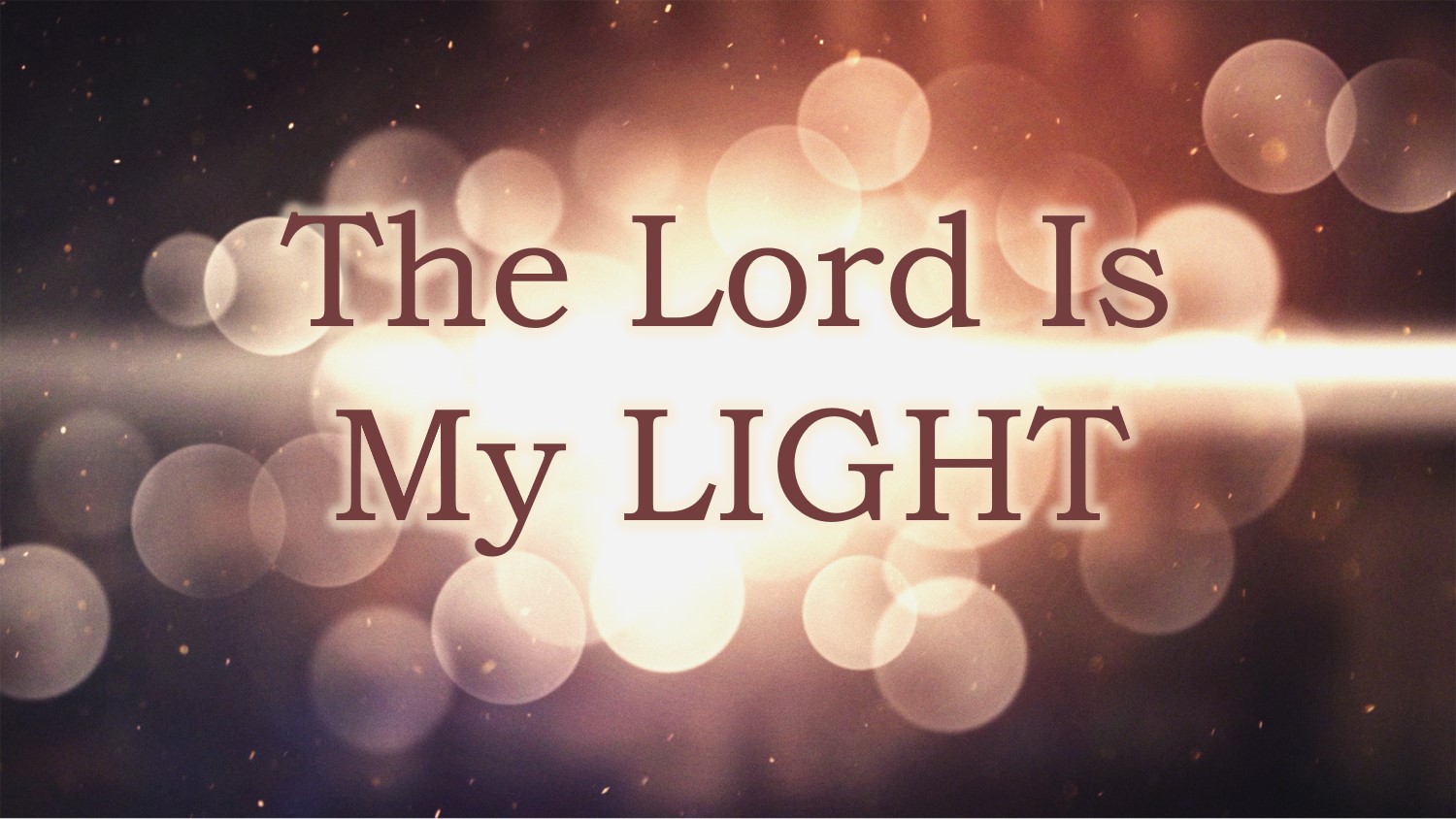Blog
The Lord Is My Light
Thursday, May 20, 2021
As hopefully most of us have picked up on by now, our congregational theme for the year is “Be the Light”. As a result, Clay and I are going to be spending the rest of the Sunday mornings in May preaching on various aspects of light. We aren’t going to be following any particular theme, just looking at the abundant Biblical discussions of light.
This morning, though, I’d like to look at a passage that reminds us that we’re mirrors, not light bulbs. The light that we shed isn’t our own light; instead, it is the light that we reflect from God. Without His light, we would spend our lives in darkness.
This is important all the time, but it is especially important in difficult times. Even when we feel like the night is closing in around us and there is no hope, God still gives us hope. His power, compassion, and love constantly show us the way forward. Without Him, we cannot succeed, but with Him, we cannot fail. This is not a new insight; indeed, it is something that David understood very well 3000 years ago. Let’s consider what it means, then, that the Lord is the light for each one of us.
Our text, of course, will be Psalm 27, and in it, David first identifies God as THE STRONGHOLD OF MY LIFE. Look at Psalm 27:1-3. David’s fearlessness really shines through in this reading, but the important point is that David’s confidence isn’t in himself, even though he was a gifted man. His confidence is in God.
The same holds true for us. God is the only reason we can have to be fearless. Somebody who goes through life without God and is confident and unafraid isn’t courageous. They’re a fool. Sooner or later, something is going to happen in every one of our lives that we cannot handle. However, there is nothing that can happen that God can’t handle, so fearlessness in Him is completely justified.
Second, notice how David looks to the past for confidence for the future. God defeated his enemies for him before, so no future enemies can make him afraid. This is a vital lesson for us. Repeatedly, God has proven Himself to be faithful. We see it in the lives of the people of the Bible, and if we’ve been Christians for any length of time, we’ve seen it in our own lives too. On that basis, we can be sure that God will be faithful in the future too. Whatever lies in front of us, He will get us through it!
In the next section of the psalm, David asks for ONE THING FROM THE LORD. He explains in Psalm 27:4-6. This is an interesting text. David asks God to let him dwell in His house and His temple all the days of David’s life, but as far as we know, there wasn’t a temple in existence during David’s time at all. We should understand this, then, as not being about any earthly building, but as being about God’s heavenly presence.
This is sort of like walking with God. It doesn’t mean that we can look over and see Him trotting down the sidewalk next to us. Instead, it means that we are abiding in Him.
It’s vital for us to be with God because when we’re with Him, He’s with us. As David observes, that’s when He protects us in times of trouble. David describes Him as simultaneously hiding us in His tent and putting us on a rock. Basically, the protection that God offers is the best that it can possibly be.
When God is faithful to us, though, we have a responsibility to be faithful to Him by doing what David describes—praising Him for His goodness. Too often, we busily bang on God’s door when we’re in trouble and need help, but as soon as He helps us, we go our way without even a thank-you. That’s not right. Every time we experience God’s blessing in our lives, let’s make sure that we glorify Him as He deserves.
The third part of the psalm is about SEEKING GOD’S FACE. Consider Psalm 27:7-10. Once again, I think this is a passage about not taking God for granted. My father-in-law likes to joke, “I told you I loved you once. If that changes, I’ll let you know.” That’s not how our relationship with God ought to be. If we truly are intent on dwelling in His house, we need to be calling out to Him and seeking His face continually.
We do this in part because we recognize the all too ample reasons we give Him to turn away from us. When David is worried about God turning him away in anger, he’s not just being paranoid. He says this because he knows he’s an imperfect man seeking a perfect God. When we get complacent about our sin, God will turn away from us in anger too. Instead, we must seek Him in humility and repentance.
Notice, though, what the result of seeking God in this way will be. He will be a better protector for us than our own parents would be. For some Christians, sad to say, this is a low bar to meet, but in my case, I had amazing parents, and God is still a more faithful friend than they were! How good it is to have a God we can trust so much!
Finally, the psalm discusses WAITING FOR THE LORD. Let’s read here from Psalm 27:11-14. One of the things that I love about the Psalms is the way they capture the divided thinking of humankind. On the one hand, we see that David is concerned about a new batch of enemies that has risen up. On the other, though, he expresses complete confidence in a positive outcome despite his fear.
Isn’t this so often the way that our own minds work? I know who God is. I know that I’ve seen His goodness in my life, over and over again. And yet, every time I see some new challenge ahead of me, there’s that little voice inside my mind that says, “This time is different. God won’t get you through this one.”
When we hear that little voice, it doesn’t mean that we are unbelieving, any more than David was unbelieving. It means that we’re human. Always, our hearts will be divided between faith and fear. God knows that, and He wants us to know that it has always been so with His people.
Look, though, at what the conclusion of David’s self-talk is. He tells himself, “Wait for the Lord.” This is where our self-talk should end too. No matter what our problems are, waiting for the Lord is always the right answer. Even if we do not see how it possibly could work out, God knows just what He will do. He will be faithful to us as He always has been faithful to all of His people.
The Heroes of Faith Are Watching
Tuesday, May 18, 2021
Hebrews was my father’s favorite book of the Bible. I have his old Bible in my office, and inside it, the pages of Hebrews look like somebody used them to scrub the kitchen floor at Long John Silver’s. I spent countless hours discussing Hebrews with him before I ever moved out, and yet, to this day, every time I study the book, I find some new proof of the writer’s extraordinary vision and power.
During this particular reading, I was struck by the connection between the argument of Hebrews 11 and its conclusion at the end of the chapter and the beginning of the next. I see the theme of the argument really begin to emerge in the writer’s discussion of Abraham in 11:8-10. He notes that by faith, Abraham left his homeland, even though he didn’t know where he was going.
This is true in two senses. First, Abraham had never laid eyes on the promised land of Canaan. Second, though, the writer notes that Abraham wasn’t really seeking Canaan. Instead, he was looking for the city whose builder and architect was God. By faith, he was seeking an eternal dwelling place—even though he had no idea that such a dwelling place existed! He listened when God said “Go out to the place that I will show you,” without the foggiest idea of what his reward would be.
In Hebrews 11:39-40, notes that what was true of Abraham was true of all the Old Testament heroes of faith. They gained God’s approval, but they never received the promise. They never experienced the fulfillment of God’s purpose in Jesus, and they could not be perfected until that purpose was fulfilled.
Neither of those things is true for us. In Christ, we already have been perfected. As per Hebrews 12:2, in Him we see the fullness of the revelation of God’s mystery. The progress of the faithful, from suffering and shame to eternal glory, is spelled out for us in His life, death, and resurrection as a matter of historical certainty.
In the face of these facts, the writer urges us to do two things. First, we must keep our gaze fixed on Jesus. If we do not grow weary and lose heart, what happened to Him surely will happen to us. His glory will be our glory too, and if He is always before us, we constantly will be reminded of that truth.
Second, even as we fix our eyes on Jesus, we must remember that others have their eyes fixed on us. In Hebrews 12:1, the cloud of witnesses that surrounds us is none other than the faithful people of Hebrews 11. They ran the race without the advantages that we have, and they want to see how we will run it with those advantages. Abraham didn’t know where he was going, but he arrived there anyway. How sad it would be if we, with our knowledge of what awaits us, fall short of his example of faith!
Divorce, _Apolyō_, and Matthew 19
Monday, May 17, 2021
A couple of weeks ago, the centuries-long dispute over marriage, divorce, and remarriage popped up on my Facebook feed again. As usual, somebody found a reason why they thought that the restriction of Matthew 19:9 did not apply to Christians today who are divorced for reasons other than a spouse’s adultery.
In this case, the argument centers around the Greek word apolyō, which is rendered as “divorce” in our modern translations of Matthew 19:9. That notwithstanding, proponents of this view claim that apolyō should not be translated as “divorce”. They note that the KJV translates it as “put away” (as indeed it is translated in other contexts in modern translations), and they assert that putting away was an action distinct from divorce. Formal divorce involved the writing of divorce of Deuteronomy 24:1; putting away was just informally kicking your wife to the curb. Thus, Matthew 19:9 does not apply to the formal divorces of our day, and all divorced Christians can remarry without fear.
As appealing as this argument is (Matthew 19:9 certainly is among the hard sayings of Jesus, and life would be easier for all of us if it became a dead letter), there are several problems with it. First, I’m not aware of any evidence that the Jews of Jesus’ day made a distinction between informal putting away and formal divorce. If you’re going to hang your whole argument on the existence of an ancient custom, you probably need to establish that the custom existed first!
Second, this is a the-translators-got-it-wrong argument, and we always should regard those with skepticism. Admittedly, translators and Greek scholars are not perfect, and they sometimes make mistakes in their work with ancient languages. However, if even experts in the field can err, how much more error-prone are non-experts likely to be! If we can’t prove our argument from the Bible without making a significant change in translation, we are staking our souls on the presumption that we are right and hundreds of original-language scholars are wrong. That may represent insight, but it more likely represents self-deception.
Third, the Bible uses apolyō to mean “divorce”, which probably is why all the scholars reached that conclusion in the first place. In Matthew 19:8, Jesus notes, “Moses permitted you to apolyō your wives.” What did Moses permit? Not informally sending wives away, that’s for sure! The only procedure in the Law for separating from one’s spouse is the formal divorce-certificate process of Deuteronomy 24:1, which the Pharisees cite in Matthew 19:7. Thus, Jesus uses apolyō to refer to formal divorce, and we should understand Him as doing so in Matthew 19:9, which is the very next verse.
Matthew 19:9 isn’t anybody’s favorite commandment. However, it is a restriction that God in His wisdom and holiness has bound upon all people. As much sorrow as enforcing it can cause in this life, failure to enforce it will lead to much greater sorrow in the life to come.
God Is at Work in You!
Friday, May 07, 2021
A few months ago, Clay examined Philippians 2:12-13 in a sermon, dwelling especially on v. 13. I’ve known for years that brethren have a bad habit of focusing on “Work out your own salvation,” to the exclusion of “It is God who is working in you.” However, Clay’s study of the latter point brought home something I had never realized before.
God is working in every obedient Christian. Right now. He is working in me. Right now. He is working in you. Right now.
To describe this as heartening would be an understatement! Like many preachers, I struggle with the temptation to believe the insidious lie of Malachi 3:14. The devil very much wants us to believe that it is useless to serve God. In this pandemic era of social isolation, reduced or nonexistent assembling, and Christians fighting and splitting churches over dumb stuff like wearing masks, he seems to have a stronger case than normal. Why not give up? It won’t make any difference, right?
Wrong. Wrong, wrong, wrong, and wrong. Even if it is not obvious to us, the arc of history bends toward God. He will work out His will, He will accomplish His purpose, and He will glorify Himself through His people if they will let Him do it.
The health-and-wealth preachers have a point, kind of. God does have a plan for your life. However, His plan is not for you to enjoy earthly happiness. It is for you to put your nose to the grindstone and do right every single day, cheerfully, unfailingly. If you do, He will use you to accomplish what He wants to accomplish.
We cannot know what that is, not this side of Jordan, at least, and there is no point in speculating. If you preach the gospel and nobody listens, that does not mean you have failed. If you fight to raise godly children but they fall away, that does not mean you have failed either. God knew that His people wouldn’t listen to Jeremiah and Ezekiel, but He sent them anyway. Sometimes the Spirit convicts rather than converting, but that too is in accord with His purpose.
Throughout history, it always has seemed as though the cause of righteousness is failing. It seemed so when the wicked rejected Noah, when Israel sank into corruption in the time of the judges, when Solomon forsook the Lord, when the Israelites were carried captive, when Jesus was crucified, and when Saul shattered the Jerusalem church. God’s people always appear to be given over to death. If it seems so in the present time, that should not surprise us.
Of course, the cause of God never actually does fail. Repeatedly, He brings about salvation in ways that no one else could have foreseen. He accomplishes His most spectacular works in the hours that seem darkest.
So it will be for us, if indeed we do not grow weary and lose heart. If we work, God will be at work in us, and He will succeed in His purpose. Go then, and work, whether preaching or teaching or supporting your family or raising your kids or watching your grandkids. Even if nobody else notices or cares, you can be certain that your labor is not in vain in the Lord.
A Place of Prayer
Thursday, May 06, 2021
Acts 16:13 describes one of the humblest locations in which Paul ever preaches the gospel to a group of people. He and his companions have come to the city of Philippi, a Roman colony. Probably because of its largely Gentile composition, Philippi doesn’t have a synagogue, so those who wish to worship the God of Israel on the Sabbath must do so by the bank of the River Gangites. There, Paul proclaims Christ and makes his first converts in Europe.
Though picturesque, this riparian setting is only one of many places where we see Christians assembling in Acts. They honor God in the upper rooms of houses (Acts 1:13), a portico of the temple (5:13), synagogues (13:14), the marketplace (17:17), a stony hilltop (17:17), a lecture hall (19:10), a beach (21:5), the deck of a ship (27:35), and rented quarters (28:28). The most specific inference that we can draw from this is that early disciples met together whenever and however they could. In this area, the New-Testament pattern appears to be “Whatever works”.
This observation becomes relevant in our discussions of Bible authority with others. If we criticize some use of church funds as unauthorized, frequently, someone will fire back with the reply, “Well, what about church buildings???” Of course, none of these people really have any problem with church buildings. Instead, their goal is to establish that we are inconsistent in our adherence to the first-century pattern.
I see two problems with this argument. First, as noted above, there is no discernible pattern with respect to the meeting places of first-century Christians, and not even a discernible pattern when it comes to spending money on meeting places. The riverbank was free. The school of Tyrannus probably wasn’t (at least, churches today that meet in schools generally have to pay for the privilege). Paul’s rented quarters weren’t; indeed, they were paid for by support from churches.
The synagogues weren’t free either, rather being built and maintained by the Jews of the community. Did the people of Iconium who believed in Acts 14:1 stop showing up at the synagogue the next week because it was A Misuse Of The Lord’s Money? Instead, throughout Acts, we see brethren taking advantage of purpose-built meeting places as long as they can.
Second, as per Hebrews 10:25, assembling is part of the work of the church. How can we do this? The Jerusalem church could meet in the massive colonnades of the temple for free; but the Jackson Heights church can’t even meet in a pavilion in a city park without paying for it. No member of the congregation owns a house where even half of us can gather. Either we spend money on meeting, or we become, quite literally, fair-weather Christians. Under these circumstances, the use of the Lord’s money to ensure that we can come together and build one another up every first day of the week is entirely appropriate.


